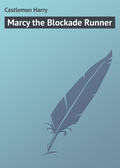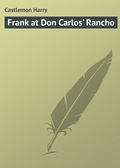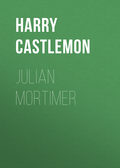
Castlemon Harry
True To His Colors
CHAPTER IX
THE COMMITTEE AT WORK
Elder Bowen's negro boy Sam, who was working among the flower-beds with his master, sought safety in flight when Bud Goble's coming was announced, and, standing concealed behind an evergreen in the garden, saw and heard all that passed between the minister and the man who had come there to browbeat him. When Bud was ejected from the grounds Sam came out from his hiding-place grinning broadly.
"Marse Joe," said he, as soon as he could make himself understood, "dat beats all de sermons you ever preached all holler. It does so. But, Marse Joe, I 'fraid Marse Gobble gwine make ole Toby trouble all along of dat babolition paper. De nex' time he go dar he ax Uncle Toby whar he got dat money of his'n stowed away. Dat's what I 'fraid of, sah.'
"I didn't think of that, and perhaps it would be well for you to run over and put Toby on his guard," replied Mr. Bowen. "Neighbor Goble is on the war-path sure enough, and he would just as soon rob that old negro as to rob a white man. Tell Toby to give the money into his master's keeping."
Sam obeyed instructions, but we have seen that the suspicious old Toby was not willing to listen to advice. He was terribly alarmed when Sam told him what Bud had been about that morning, and taking advantage of his master's absence, and of his own position as helper about the stables, he dug up his money which he had buried before daylight, and posted off to the academy to have a talk with one of the Gray boys. He kept to the fields and gave the roads a wide berth; but he was obliged to cross one highway during his journey, and that was the time Bud Goble saw him. The old negro's actions excited Bud's interest as well as his suspicions, and having nothing else to do, he rose from his log and followed him.
And right here it is necessary to make a short explanation in order that you may understand what happened afterward. Rodney and Marcy Gray had been studying at the academy for almost four years, and although they were popular among all classes in and around Barrington, there were some, whites as well as blacks, who invariably got them mixed up, and never could tell one from the other unless they chanced to meet them in company. It was Rodney, the rebel, who helped Bud Goble when his family were all prostrated with the ague, and offered him a reward for finding that underground railroad, but it was Marcy, the Union boy, who picked the banjo with superior skill, danced and sung his way into the affections of the plantation darkies, and saved old Toby's melon-patch from being devastated by the students. These two had eaten a good many of old Toby's melons, and more than one Thanksgiving turkey which graced his table had been bought with their money. Believing from what Sam told him that his hard-earned wealth was not safe as long as he knew where it was, Toby decided that one of these two boys, the one he happened to find first, should be its custodian. Dick Graham, who was on duty at the front gate, told him where Marcy was, and the old man lost no time in making his way through the woods to his friend's beat. But Marcy declined to accept the responsibility, as we have seen, and so Toby took the money back and hid it in the ground whence he had taken it. He would have been better off – almost two hundred dollars better off – if he had done as Mr. Bowen and Marcy advised him to do; for Bud Goble dogged his footsteps every rod of the way, and Toby never once suspected it. Bud did not hear what passed between Toby and the sentry – he dared not go close enough for that; but he saw the stocking that went back and forth between the iron pickets of the fence, and he was in plain sight of the negro when he returned it to its hiding-place.
Here again Toby made a great mistake. If he had concealed the money under his cabin, within hearing and scenting distance of the coon dogs that were so numerous in the quarter, it would have been comparatively safe; but he was so very much averse to having it around him that he took it behind his garden-patch, rolled a decayed log from its bed and buried it there, covering it with his hands, and rolling the log back to its place.
"Dar now," said Toby, loud enough to be overheard by the man who was crouching in the bushes not more than twenty yards away. "Nuffin can't find it dar 'ceptin' de hogs, an' dey can't eat it."
"That's a fact," soliloquized Goble, chuckling to himself. "But a two-legged hog like me can eat an' wear the things it will buy. Who keers for preachers an' storekeepers now? 'Pears like this mornin's work is goin' to turn out all right after all; don't it to you?"
Through the rails of the fence Bud Goble watched Toby until he disappeared in the quarter, and then he crept up to the log. In ten minutes more old Toby's money was tightly buttoned under the breast of his coat, and Bud, highly elated with the result of his morning's labor was taking long strides toward his cabin.
"I aint got the dress an' shoes I promised to have for ye when I come home," said Bud, when he burst in upon his wife, whom he found engaged in her usual occupation – sitting in front of the fire with her elbows upon her knees and a cob pipe between her teeth. "Old man Bailey wouldn't trust me, but Toby wasn't so perticular. He hid this here stockin' under a log, an' bein' afeared that the hogs might come along an' root it up an' carry it away, I jest thought I'd take keer on it for him," added Bud, laughing loudly at his own wit.
The woman's eyes glistened as she thrust her bony arm into the stocking and brought out a handful of shining silver coin. She would have her dress now in spite of old man Bailey; and as for Toby – she gave scarcely a thought to the consternation and alarm that would almost overwhelm him when he discovered his loss, for a field hand had no business to have a stocking half-full of money, when white folks did not know where their next meal was coming from. Her only fear was that Mr. Riley might somehow learn that Bud had taken the money, and then there would be trouble.
"You must look out for that yourself," Bud declared. "I've done my part, an' if you can't hide the stockin' where nobody can't find it, an' keep a still tongue in your head about our havin' it, you aint the woman I take you for. Now give me what you think your dress'll cost, an' a trifle more to put in bacon an' meal, an' I'll go an' get 'em."
His wife complying with the request, Bud hung his rifle upon its hooks over the fireplace and posted off to Barrington, where a surprise, that was not altogether an agreeable one, awaited him. He could not find any of his friends, but every one on the street, with whom he exchanged a word of greeting, seemed to know all about the adventures he had had that day. Bud didn't mind being told that he had permitted a little old man, who could not stand against a twelve-year-old boy, to scare him with a revolver, for he was not the only one in that scrape. Four other men had stood on the outside of the counter while Mr. Bailey talked to them as he pleased; but when folks came to joke him for being walked out of the yard by a preacher, it was more than he could endure.
"Jest let him get the grip on you that he got on me, an' he'll make the best among ye walk turkey," Bud retorted sharply. "There aint a man in town that's got any business with him, if he is a preacher. But let me tell ye: He aint by no means heared the last of me yet."
Bud saw signs of suppressed excitement on all sides and in the face of every man he met; but, conceited as he was, he could not believe that the excitement was occasioned by the incidents of which he had been the hero. They might have had something to do with the grave look he saw on Mr. Riley's face as the latter hurried by him without speaking, but Bud believed that there was something else in the wind of which he had not heard. It had such a depressing effect upon him that he transacted his business with as little delay as possible and went home.
"There's goin' to be doin's of some sort or another about yer, an' before long, too," said he, as he handed his wife the articles he had bought for her, and deposited the bag containing the meal and bacon on the floor. "I don't know what's up, but Riley an' among 'em look sorter uneasy. Mebbe that outbreak old woman, that's what's the matter, sure's you're born. That outbreak's comin', an' who knows but it'll be here this very night?"
"Good lands save us!" exclaimed Mrs. Goble, in alarm; and even her husband looked as though he would have liked to go to a little safer place than Barrington was, if he had only known where to find it.
"Yes, sir, that's jest what's the matter," repeated Bud. "Riley's somehow got wind of it, an' that's what made him look so glum. Why didn't he stop an' tell me all about it, I'd like to know. I'll jest tell him he mustn't do that a-way no more, kase it aint right long's I am workin' for that committee. Say," he continued, lowering his voice almost to a whisper. "When John Brown made that raid of his'n, Barrington was one of the places that was marked on his map to be burned, kase there was more niggers here than white folks. 'Member it, don't you?"
"Good lands!" cried Mrs. Goble, who, if she had ever before heard of the circumstance, had quite forgotten all about it.
"That's what Riley says," continued Bud, "an' who knows but the thing we've been a-dreadin' is comin' now? They do say that there's guns an' things hid somewheres in the woods – "
"You don't tell me!"
"It's jest what I do tell ye, kase I've heard it often. Of course the niggers knows where them guns is, an' when they an' the babolitionists like Elder Bowen get ready, they'll fetch 'em out an' go for us."
In a very short time Bud succeeded in talking himself into a most uncomfortable frame of mind. He did not feel quite safe at home, for his cabin was exposed, being fully a quarter of a mile from the nearest house, and he was afraid to go into town. His utter ignorance of the nature of the danger that threatened him made the situation hard to bear. As for fighting in case he were attacked – that was something Bud had not yet thought of. He would have preferred to run. His wife was so badly frightened that she could scarcely cook the dinner, and Bud could eat but little of it after it was cooked; but he smoked more than his share of tobacco, managed to run a few extra bullets for his rifle, and to bring in a supply of light-wood sufficient to keep a bright fire burning during the night.
As the sun sank out of sight behind the trees, and daylight faded and darkness came on, Bud's fears grew upon him. He dared not stay in the cabin for fear that some evil-minded Union man might slip up behind it, and shoot him through some of the cracks where the chinking had fallen out, so he drew one of the rickety chairs in front of the door and sat upon it, with his rifle for company. That was a little better than being cooped up within doors, but the unwonted silence that brooded over the surrounding woods distressed him.
"Durin' all the years we've lived yer I never seen the road so deserted as it is to-night," he said, in a whisper to his wife. "There's always somebody goin' one way or t'other, but now they seem to have holed up."
"Mebbe they're feared the outbreak'll ketch 'em," Mrs. Goble suggested.
"What does it look like, any way?"
"Now, listen at her!" exclaimed Bud, in accents of disgust. "'Tain't a hant that'll run after you, all dressed up in white, an' retch out its hands to grab – "
"Don't, don't!" cried his wife, shuddering perceptibly and covering her eyes with her hands to shut out the picture that Bud's words had conjured up. "Don't talk that a-way."
"Well, then, an outbreak is a-a-thing where the niggers an' babolitionists run around, whoopin' an' yellin' like they was wild Injuns, shootin' the men an' scalpin' the women folks an' burnin' an' stealin'," said Bud. "That's what an outbreak is, an' you can see for yourself what will happen to us if one of 'em gets loose in Barrington. I wish't somebody would come along from over town so't I could ax him how things is goin' there."
But no one came, and for long hours Bud Goble sat there, listening and peering into the darkness, and in momentary expectation of hearing or seeing something alarming. About midnight, however, the excitement began. At that hour Bud mustered up courage enough to start on a trip around the cabin, and when he got to the back of it, where he could look through the tops of the trees toward Mr. Riley's house, he stopped as if he had suddenly been deprived of the power to go a step farther. The sky in that direction was glowing with a brighter red than he had ever seen at sunset, and the longer he looked at it, the brighter it grew. Beyond a doubt Mr. Riley's house was on fire. When this thought flashed through Bud's mind, the cold chills crept all over him, and instead of hastening to render what assistance he could in saving the planter's property, he turned and ran into the cabin, banging the door behind him, and dropped the heavy bar to its place.
"Good lands!" exclaimed Mrs. Goble, whom her husband, in his excitement and terror had upset, chair and all, in front of the fireplace.
"Don't stop to talk, old woman," said Bud, in a hoarse whisper, "but get up an' fly around an' do something. The outbreak has come like I told you it would. Riley's house is a mask of fire. If you don't b'lieve it peep through this yer crack."
For a minute or two the deep silence that reigned in the cabin was broken only by the hurried breathing of its frightened inmates, and then there came a sound from the outside – a quick, heavy step on the hard ground, followed by the fumbling of a hand for the latchstring. Bud's face grew as white as a sheet, his knees trembled under him, and the muzzle of his rifle, which he tried to point toward the door, covered every square foot of surface on that side of the cabin in two seconds' time.
"Who's there?" he demanded, in quavering tones. "Speak up, for there's a bullet comin' right through the door where you stand."
"What's the matter of the fule?" inquired the man on the outside; and
Bud recognized the voice of one of his friends. "Lemme in."
Bud was only too glad to comply. He threw up the bar, opened the door, and Silas Walker same in the man who held his rifle in the store while he was making ready to punish Mr. Bailey for refusing him credit. Bud was glad to see that he was not the only one who had been alarmed and excited by that blaze in the sky. Silas's face had no color in it to speak of, and he trembled as he moved across the floor.
"How did you get home so quick?" were the first words he spoke.
"Who? Me?" cried Bud. "I've been home sense noon; aint I, old woman?"
"Then who done it?" questioned Silas.
"Done what?"
"Set the elder's house on fire."
Bud was astounded, and so was his wife. The former looked sharply at his visitor for a moment, and then backed toward the nearest chair.
"Isn't it Riley's house?" he gasped.
"Course not. I can see it plain from my door, an' there's Riley's house standin' up safe an' sound as it ever was. It's Elder Bowen's, fast enough. I kinder thought you done it to pay him for shovin' you outen his lot by the neck, and I said to my old woman that you had sarved him jest right; but if you didn't do it, then some of that Committee of Safety must be to work."
Bud hadn't once thought of that, and it put an entirely different look on the matter. If it was true that the "outbreak had come," it must be that —
"There's a light off this a-way, too," observed Mrs. Goble, who to conceal her agitation from the visitor, had moved around the room until she found an opening between the logs through which she could look out toward Barrington. "'Pears like there might be an other house a-fire."
"Hey-youp!" yelled Bud, whose terror had given away to almost fiendish exultation. "The outbreak has come, like I said it was goin' to do, but it aint the babolitionists an' niggers that's doin' of it. It's our own friends. Come on, Sile. Me an' you mustn't hang back when there's work to be done for the 'Federacy an' danger to be met."
"Now's a good time to settle with old man Bailey," Silas remarked.
"Couldn't find a better if we tried for a whole month," replied Bud gleefully. "I knowed I would get even with him some day, but I didn't think it would come before I'd had time to sleep. Hush yer noise, old woman. Course I'm goin' up there. Riley said the 'Federacy would look for every man to do his dooty when the time come, an' if it aint come now, I'd like to know what's the reason. Nobody won't harm you here."
In spite of the querulous protests of Mrs. Goble, who strongly objected to being left alone now that "the outbreak had come," Bud and his companion rushed out of the house and started for Barrington, running full tilt all the way for fear that the fun would all be over, and the home of every Union man in town be destroyed before they could get there to lend a hand. There was no suspicion in their minds that these two fires, located so far apart, could be the result of accident. If there was any faith to be placed in that notice in the post-office there had been an outbreak of some sort threatened, and beyond a doubt the members of the Committee of Safety had thought it wise to anticipate it by driving from Barrington every man who was suspected of being implicated in it. That was the way Bud and Silas reasoned it out, and although they were not altogether correct, they had hit pretty close to the mark.
When they reached the cross-roads, so that they could look two ways and see both the fires at once, they told each other that the houses must have been burning for some time before they knew it, for the roofs had fallen in and the blaze was beginning to die away. But where were the engines? They could not hear any bells or brakes at work, and if there were any commands given the breeze must have carried them the other way.
"That committee of our'n has got everything cut an' dried," was Bud's gleeful comment. "Let Riley an' them fellers alone for doin' things up in shape when they get at it. But it won't do for us to say that we suspicion them, for I've kinder thought, from the way they acted, that they wanted to stay behine an' pay sich chaps as me an' you for doin' the work. Now le's scoot off this a-way an' set old man Bailey agoin'."
Bud Goble, who had taken the precaution to put some matches in his pocket before leaving home, led the way along the short cut, congratulating himself on the fact that he and Silas would have a clear field for their operations, for of course the little storekeeper, and all of the rest of the men in town, were congregated at the fire. So intent were they on taking vengeance on Mr. Bailey that they did not go a step out of their way to locate the fire that was raging in town, but went straight towards the store, and without taking the least care to conceal their movements.
"It's all dark," whispered Silas. "But I don't reckon we'd best go any furder on the road. Le's go through the field an' come up behine it."
Before Bud could say a word in reply or make a motion towards acting upon the suggestion, a clear strong voice directly in front of them, and but a short distance away, called out:
"Halt! Who comes there?"
"Well, I do think in my soul!" exclaimed Silas. "Who do you reckon that is?"
Bud was frightened again, and couldn't speak. He could not see anybody, either; but if it should chance to be old man Bailey who was on the watch, wouldn't he know in a minute what it was that brought Bud there at that hour, and would he not be likely to use that revolver if he had it about him? While Bud was trying to make up his mind what he had better do, take to his heels, or stand where he was until someone came up and identified him, the challenge came again, and in more peremptory tones.
"Who comes there?" cried the voice; and the question was followed by a sound that was suspiciously like the clicking of a gun-lock.
"It's us," replied Bud, who began to think he ought to say something.
"Halt, us!" commanded the voice. "Corporal of the guard number one!"
All of this was quite unintelligible to the two men, who could scarcely have been more bewildered and alarmed if they had found themselves confronted by one of those "white things" that Bud had described to his wife; and when they heard the unmistakable sound of footsteps on the road, without being able to see who or what it was that made the noise, they could stand it no longer, but faced about and ran for their lives.
"Halt!" shouted the voice, three times in quick succession; but the frightened men did not stop. A second later there was a flash and a roar behind them, and a musket ball whistled through the air and threw up a little cloud of dust a few yards further along the road. One of those would-be incendiaries came very near getting his exemption papers that night.







